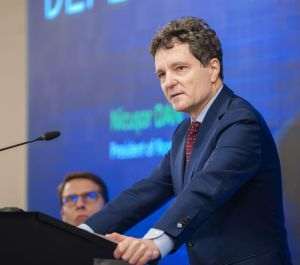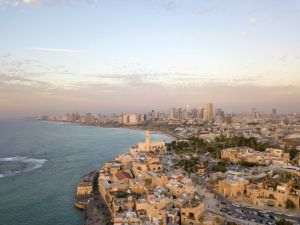The year 2024 was marked by economic-financial and socio-political convulsions, which accentuated Romania's vulnerabilities in the face of domestic and international challenges. From the alarming budget deficit to the uncontrolled increase in public spending and the degradation of the image abroad, what happened during the past year demonstrated the inability of political decision-makers to implement sustainable and coherent reforms.
The social convulsions in the first three months of the year - which started strongly in January when farmers and transporters blocked road traffic in all the country's major cities, including Bucharest - forced the PSD-PNL governing coalition to make populist, but unsustainable, decisions. To calm popular discontent, the Ciolacu government decided to increase budget spending by allocating significant amounts to finance support schemes in the agricultural sector, the road transport sector, and the health sector, as well as by hiring over 10,000 civil servants, increasing public sector salaries, and increasing the gross minimum wage to 3,700 lei.
These measures, far from having a solid economic foundation, were supported by contracting record loans of 135 billion lei in the first semester, which led to the budget deficit reaching 3.6% of GDP at the end of June. The European Commission has repeatedly warned that Romania will not meet the 5% budget deficit target for the end of the year, forecasting an excess of over 7% of GDP, but the warnings of officials in Brussels were not taken into account in the first half of last year by political decision-makers in Bucharest, who hoped that at the end of June they would record a boom in tax revenues with the collection of turnover taxes established in the fall of 2023 to the state budget and by increasing the VAT collection base with the generalization of the RO e-Invoice and RO e-Transport programs.
The only good news of the first semester was the reduction in the inflation rate from 7.41% in January to 4.9% at the end of June, amid prudent monetary policies adopted by the National Bank of Romania (BNR). However, the NBR kept the benchmark interest rate at a high level of 7% until July, which contributed to maintaining moderate consumption.
A key moment in the first half of the year was the victory in the Rosia Montana trial against Gabriel Resources. Although this was a legal success for the Romanian state, it was overshadowed by the uninspired statements of Prime Minister Marcel Ciolacu and Finance Minister Marcel Boloş, which fueled speculation on the Canadian stock market.
Externally, President Klaus Iohannis failed in the race for the position of NATO Secretary General, which weakened Romania's influence in international structures. At the same time, the decision of the Supreme Council for National Defense to donate a Patriot system to Ukraine, at the request of President Joe Biden, generated internal controversies related to the financial sustainability of such an action.
The Ciolacu Government's poor management of the country's problems continued in the second half of last year, when state spending continued to increase, leading to an alarming budget deficit of 8.65% of GDP (152.72 billion lei), far exceeding the limits assumed by the European Commission. In its decision to increase budget spending, the Executive was also encouraged by the decisions of the National Bank of Romania, which consecutively reduced the reference interest rate by 25 percentage points, setting it at 6.5% for the last part of the second semester.
Against the backdrop of this economic instability, the political scene was marked by major tensions. The first round of the presidential elections, held on November 24, was won by Călin Georgescu, the sovereignist candidate. This result sparked vehement reactions from traditional parties, and the election was annulled by a highly controversial decision of the Constitutional Court, based on information provided by the SRI, STS, SIE and the Ministry of Interior in the CSAT meeting on 28 November and declassified by President Klaus Iohannis on 4 December. This event amplified the protests from voters of nationalist and sovereignist parties and triggered a major constitutional crisis.
Read 2024 in numbers
The results of the parliamentary elections on 1 December brought three sovereignist, nationalist parties to Parliament, which obtained over a third of the mandates, complicating negotiations for the formation of a new government. However, the PSD-PNL-UDMR-National Minorities Group coalition managed, on 23 December, to impose a new cabinet also led by Marcel Ciolacu. However, the end of the year was marked by the adoption of new austerity measures through the controversial "Trenuleţ" Ordinance, which generated social protests and strikes, questioning the stability of the Executive in 2025.
Practically, it can be said that the year 2024 was defined by a sharp imbalance between decision-making populism and harsh economic reality. The unsustainable increase in public spending, the inability to implement fiscal reforms and the loss of international credibility have transformed this year into one of missed opportunities. With a record deficit, an image crisis abroad and a fragile political climate, 2025 seems to be a year of major challenges for our country.
• January - the month of protests
The year began with large-scale protests that shook the political scene. Farmers and transporters, dissatisfied with the fiscal measures imposed by the Government at the end of 2023 and the generalization, starting with January 1, 2024, of the Ro e-Factura and Ro e-Transport digital reporting systems, as well as the increase in excise duties on fuel and RCA tariffs. Because in the first days of the protest the central authorities chose to ignore the farmers, they were joined by transporters, who took over some of the requests of agricultural producers, and the protest gradually expanded to 22 counties of the country, where several roads were blocked, making road traffic difficult. In an attempt to ease tensions, the Government adopted emergency legislative amendments, but the protesters' demands continued to put pressure on the authorities. The crisis highlighted the lack of real dialogue between decision-makers and the private sector, affecting budget execution since the first quarter.
• February - Pfizer sues Romania for vaccines ordered but unpaid
Another major issue erupted in February, when Pfizer filed an international lawsuit against Romania, demanding payment for millions of doses of COVID-19 vaccines ordered but unpaid. According to the international case, Pfizer is demanding that the Bucharest government pay 564 million euros for the 28.94 million vaccines ordered by the Cîţu government, but whose purchase has not been finalized. This litigation has brought to the fore the lack of a clear strategy for purchasing and managing the health crisis, generating new political disputes.
Also this month, the Government announced the simultaneous organization of the European Parliament and local elections, a measure criticized by the opposition, which accused the ruling parties of electoral manipulation.
February was also marked by the controversial statements of Prime Minister Marcel Ciolacu regarding the Roşia Montană case, although from September 2023 - when the debate procedure at the international arbitration court ended - and until February 1, 2024, the head of the Government had no public statement on this matter. At the end of February, the Prime Minister became categorical in his statements regarding Roşia Montană, giving the impression that he was very certain that our country would lose the trial and be forced to pay compensation of 6.7 billion dollars, which would have represented a heavy blow to the state budget.
• March - Air and maritime Schengen for Romania
A historic moment was marked at the end of March, when Romania was accepted into the Schengen Area for air and maritime transport. The elimination of airport border controls was hailed as a diplomatic victory, although full entry into Schengen, including for road transport, remained an unattainable goal.
Also in March, the Government continued to adopt price cap measures and make controversial fiscal changes, thus increasing the economy's vulnerability to external imbalances. In these circumstances, it came as no surprise that European Commission officials, in the report published on March 25 on macroeconomic imbalances in our country, showed that, despite some improvements, Romania still faces vulnerability in tax revenues, and large budget deficits and a high inflation rate, which are all above pre-pandemic levels, make the national economy potentially vulnerable to shocks.
We received some good news in early March when the International Court of Arbitration on Foreign Direct Investment ruled that our country was right in the Roşia Montană case and rejected the request of Gabriel Resources and Rosia Montană Gold Corporation for compensation worth 6.7 billion dollars. The news from Washington overturned all the pessimistic statements made in connection with this process during February by Prime Minister Marcel Ciolacu and Minister of Finance, Marcel Boloş.
• April - Păcănelele, banned in small towns
The Government continued in April its policy of increasing budget spending, including for investments made by local public administrations, but also for financing energy investment schemes and those intended for small and medium-sized enterprises.
Parliament adopted a law banning gambling in localities with fewer than 15,000 inhabitants, a measure applauded by civil society but criticized by the gambling industry. Political scandals in the governing coalition also intensified, and Cătălin Cîrstoiu's candidacy for Bucharest Mayor was withdrawn following press revelations regarding conflicts of interest. In economic terms, Standard & Poor's maintained Romania's rating, but drew attention to fiscal risks.
• May - Tarom receives state aid of almost 100 million euros
The government approved state aid of 94.67 million euros for Tarom, in an attempt to save the national airline from bankruptcy. The decision was justified by the need to modernize the fleet and maintain jobs. Also this month, the government announced an increase in the gross minimum wage and the increase in the salaries of some categories of public sector employees, measures aimed at reducing social tensions before the elections.
Also in May, the Government established the increase in the gross minimum wage in the country to 3,700 lei from July 1, a 10% increase in salaries for several categories of public sector employees -, new staff hiring (2,700 new employees only in the healthcare sector and 220 at ANAF) and the provision of new financing for farmers and companies.
Externally, we note the decision of Turkish President Recep Tayyip Erdogan to allow Romanian citizens traveling to Turkey for tourism purposes to enter the country based on their identity card, with a stay of up to 90 days within a 180-day period.
• June - Ciolacu and Ciucă win the "combined" elections
The simultaneous European and local elections brought a victory for the PSD-PNL coalition, which obtained almost 49% of the votes. The result consolidated the position of Prime Minister Marcel Ciolacu and Senate President Nicolae Ciucă. However, the budget deficit increased alarmingly, reaching 3.6% of GDP at the end of the first semester, signaling major economic risks for the second half of the year.
To counter the increase in budget expenditures, the Ciolacu Cabinet also took a set of measures aimed at improving the collection of revenues to the state budget and increasing some taxes. Thus, on June 13, the Executive decided to increase by 10.4% - the inflation rate - all mining taxes provided for by the Mining Law 85/2003, after which on June 21 it disrupted the entire business environment by adopting two emergency ordinances, without prior consultation of the social partners, normative acts that modify the e-Invoice system and introduce the Ro e-TVA system.
• July - energy deficit, prices of 1000 euros/MWh
An extreme heat wave generated a severe energy crisis, leading to an increase in energy prices of up to 1000 euros/MWh. The Government was forced to take emergency measures, including the temporary reopening of some coal-fired power plants.
In macroeconomic terms, July was marked by the continued increase in budget spending, with the Government approving new investments and support schemes, especially for farmers and producers in the agri-food industry. Although ANAF managed to exceed its collection targets for July, budget revenues were not sufficient to cover expenses. Therefore, the Ministry of Finance was forced to issue new issues of government securities and Fidelis and Tezaur bonds, borrowing considerable amounts from the financial markets to cover the deficit.
In parallel, inflation continued to decline, allowing the NBR to reduce the monetary policy interest rate by 25 percentage points - from 7% to 6.75% - for the first time since January 2023.
• August - first negotiations with the new European Commission
In the context of a growing budget deficit (4.02% at the end of July 2024, almost 100% higher than July 2023), Prime Minister Ciolacu traveled to Brussels to negotiate a long-term fiscal adjustment plan. The European Commission has called for stricter measures to reduce the deficit, but the Government has avoided drastic measures, maintaining its public spending policy. Thus, the Executive has continued to allocate amounts for various budgetary expenditures, supplementing the budget of the Ministry of Transport with 820 million lei from the Reserve Fund, that of the Ministry of Investments and European Projects with 575 million lei, and launching the Start-Up Nation Romania 2024 program, for which it has allocated funding of over 446 million euros.
The National Bank of Romania has once again reduced the monetary policy interest rate by 25 percentage points, in a last attempt for last year to stimulate the economy, stabilizing this rate at 6.5% per year. This decision was well received by financial markets and rating agencies. Fitch Agency reconfirmed Romania's rating at BBB-, with a stable outlook, noting that the Romanian economy could register a growth of 2.5% in 2024.
• September - budget rectification with negative impact on the deficit
The government carried out a budget rectification that increased spending, despite warnings from the NBR and economic experts. The budget deficit was estimated to reach 6.94 7% of GDP at the end of the year, endangering the sustainability of public finances. According to the budget rectification, the Gross Domestic Product was to be 1,768 billion lei, compared to 1,733 billion lei as provided for in the state budget law. The budget amendment provided for an increase of 8.8 billion lei in personnel expenses, 3 billion lei in interest expenses, 5.12 billion lei in social assistance expenses, but also a decrease of 1.8 billion lei in the amount allocated to investments.
After the budget amendment, in light of the need to increase state budget revenues, the Government approved a partial tax amnesty, which aimed at recovering approximately 9.5 billion lei in arrears of companies and individuals. 330,000 companies and 848,000 individuals were to benefit from the tax amnesty measure.
• October - the PSD-PNL coalition deepens the deficit, in the midst of the electoral campaign
In an attempt to maintain electoral support, the Government supplemented funds for transport, health and education, thus increasing public debt. Notable allocations included: 5 billion lei for the Ministry of Transport - directed towards infrastructure projects, 1.1 billion lei for CNAS - necessary to support medical expenses, 800 million lei for the Ministry of Education, for school infrastructure projects, massive funding for the Anghel Saligny program and the payment of outstanding amounts on the Start-Up Nation program. These measures were criticized by economic analysts for amplifying the pressure on the state budget, while increasing public debt.
Under these conditions, in order to support public spending, the Ministry of Finance continued to borrow money from international markets, launching a Samurai bond issue worth 33 billion yen, intended to attract 200 million euros. At the same time, domestic issues of Fidelis and Tezaur government securities attracted over 3.5 billion lei, surpassing previous records.
Moreover, the Ministry of Finance announced a seven-year fiscal recovery plan, but its implementation was questioned by economic experts in our country, even though the Government received the green light for it from the European Commission.
• November - presidential elections increase volatility on the BVB
The first round of the presidential elections was marked by scandals and accusations of foreign interference. Following their annulment by the Constitutional Court, independent candidate Călin Georgescu, massively supported on TikTok, is being investigated for possible links with foreign actors, after President Klaus Iohannis declassified the reports presented by the SRI, SIE, STS and the Ministry of Interior in the CSAT meeting on November 28. Amidst the political uncertainty, the Bucharest Stock Exchange recorded significant fluctuations.
Also in November, the PSD-PNL government continued to increase budget spending by allocating significant amounts from the state budget for several infrastructure projects. Among the respective allocations, we mention the amount of 10.9 billion lei for the modernization of 143 kilometers of railway, the purchase of 23 modern electric locomotives for the amount of 760.3 million lei, the purchase of nine long-distance interregional electric multiple units for 447.4 million lei, but also the supplement of the budget of the Ministry of Transport with over 1.4 billion lei to support rail transport and other infrastructure projects. In the field of state aid, the Executive decided to grant 495.2 million lei as a grant to the company Nokian Tyres for a total investment of 3.116 billion lei in Oradea. The new factory will create over 550 jobs and will have a major economic impact at the local level.
Due to the lack of funds necessary to pay pensions following the 2024 recalculation, the Government supplemented, in November, the budget of the Ministry of Labor and Social Solidarity with 1.6 billion lei, money used for the full payment of pensions in December 2024. The Executive also allocated an additional approximately 1.6 billion lei to the same ministry for the payment of allowances, indemnities and social assistance, including for heating in the cold season.
Another measure taken by the Government in November was the increase in the minimum wage, starting with January 1, 2025, from 3,700 lei to 4,050 lei, a measure that was to benefit over 1.8 million employees.
• December - Ciolacu 2 Government imposes austerity in the budgetary system and reactivates the pillar tax
After the parliamentary elections of December 1, the pro-European parties (PSD, PNL, UDMR) formed together with the National Minorities Group a majority coalition in Parliament to block the sovereignist parties that obtained a third of the deputies and senators' mandates. Based on the new agreement, the pro-European coalition approved the composition of the new government led by the same Marcel Ciolacu, as prime minister. Against the backdrop of a budget deficit that reached 8.65% of GDP and a negative rating outlook set by Fitch, the Executive has adopted drastic austerity measures for 2025, including the reintroduction of the special construction tax, the reduction of the turnover threshold for taxation of micro-enterprises from 500,000 euros to 250,000 euros in 2025 and to 100,000 euros in 2026, the increase in the dividend tax from 8% to 10%, the elimination of tax incentives for IT and construction, and the freezing of public sector salaries. These measures have been criticized by the business community and unions, being perceived as a form of austerity that undermines economic competitiveness.
The year 2024 ended under the sign of economic and financial uncertainty, given that, according to the 12-month budget execution published by the Ministry of Finance, the budget deficit reached 8.65% of GDP (152.72 billion lei), compared to the deficit of 90.06 billion lei, respectively 5.61% of GDP for the year 2023. According to the cited source, budget revenues amounted to 574.6 billion lei at the end of the second semester, while the expenditures of the general consolidated budget amounted to 727.32 billion lei (19.1% more compared to 2023).
Under these conditions, our country entered 2025 with a difficult fiscal situation and a fragile economic outlook.
However, the last month of last year brought us the decision of the JHA Council through which our country entered Schengen with land borders, starting with January 1, 2025.


























































